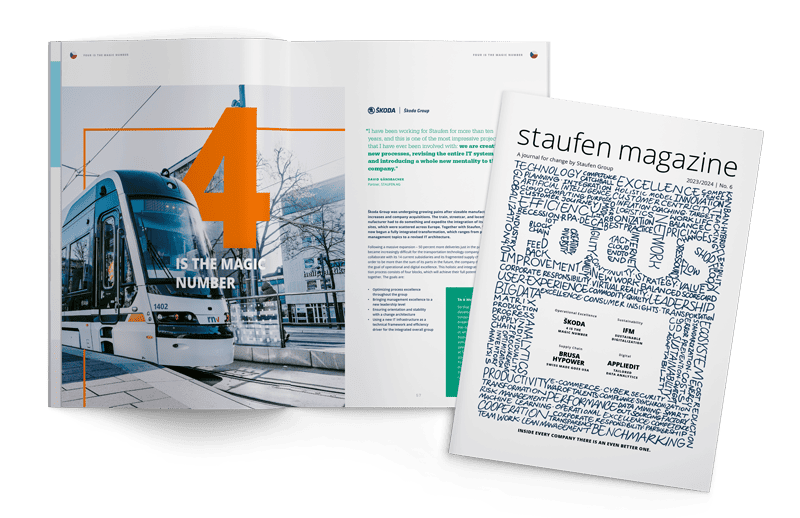
Why a strategy is only effectively implemented through excellent processes.
In the past few years, external influences on the company and its market environment, such as political decisions or shorter technology cycles, have noticeably increased in intensity and speed. For this reason, the added value that companies create for their customers comes under faster and more sustained pressure.
In addition, many companies have growing problems with the implementation of strategic initiatives. The proportion of ineffective strategic initiatives is around 70 %, according to a new study*. This is a waste of resources that a company can no longer afford.
*According to a study of the Management Institut St. Gallen
Jan Philipp Stommel, consultant at Staufen, and Max Illies, Vice President Sales at C. Illies & Co., speak about Hoshin Kanri and an effective strategy implementation.
Stommel: Mr. Illies, we met a year and a half ago through our best practice partner, MUNSCH Chemie-Pumpen GmbH. Munsch utilizes the Hoshin Kanri concept for effective strategy implementation. Why did you take part in this event?
Illies: On one hand, we were curious about what Hoshin Kanri is precisely and what methods you used to implement strategies. On the other, we were looking for support with our management strategy. We urgently needed to make our strategic management more sustainable and efficient.
Stommel: A study by a renowned institute shows that a startling 70 % of all strategic initiatives fail during implementation and do not lead to the strategic goals of the company. Why do strategies not reach their desired effectiveness in many companies?
Illies: In our case, I think it was certainly a question of weakness in the pursuit of the set goals. We set goals for years but then planned too many or too few resources for this, overspent in daily business, and ultimately lost sight of our strategic initiatives. Looking back, we can see that we didn’t do enough to truly achieve the desired goals. That was ultimately the big weakness that we had to recognize in our organization.
Stommel: We hear that a lot. At the beginning of a new strategy, there is an air of optimism; everyone is motivated and committed. The weeks pass, and daily business takes over. The strategic initiatives lose importance, are pushed to the background, or are even de-prioritized. At the same time, companies also tend to take on too many projects without understanding which project is really connected to which strategic goal.
Illies: Unfortunately, I can confirm this. We too failed to consistently pursue a common thread with our strategy. It is almost impossible to know exactly where to invest how many resources in order to achieve the planned objective in the end. If you look at the study you mentioned, you see that the strategic initiatives also do not lead to the desired results because the resources for reaching the goal were not correctly planned and utilized.

Jan Philipp Stommel
Project Manager
STERZENBACH GmbH

Jan Philipp Stommel
Project ManagerSTERZENBACH GmbH
Jan Philipp Stommel is an Associate at Staufen AG. He gained initial practical experience in the automotive industry while studying industrial engineering at the Technical University of Dortmund. At Audi AG, he supported projects in the area of incident management and process optimization, taking into account the principles and methods of lean production. He has worked for Staufen AG in Germany and China since 2018 and expanded his lean experience in direct and indirect areas. He is part of the Lean Sales & Service team. In addition to optimizing processes, he focuses on introducing the leadership concept of Shop Floor Management. Jan Philipp Stommel supports projects as a consultant as well as a trainer in companies from various industries. Moreover, through development and introduction, he has specialized in the Hoshin Kanri strategy development approach.
Read moreHoshin Kanri
Hoshin Kanri focuses on the introduction and development of employees with emphasis on the vision. It creates a connection between the vision, goals, projects, and factors for success. The X-Matrix is the tool for linking breakthrough goals, annual goals, improvement projects, and factors for success. At the same time, the inclusion of all management levels throughout all company functions serves to establish a holistic company focus and is a central component of Hoshin Kanri.
Stommel: When you look back now over the past 18 months, since we have introduced Hoshin Kanri in your company, what has changed? How would you describe the current strategy implementation process at Illies?
Illies: We use Hoshin Kanri as a framework for setting goals, pursuing goals, and ultimately also achieving them. For us, Hoshin Kanri is a very helpful and versatile set of tools, which we use to determine suitable goals, to create cascading plans for implementation, to keep an eye on progress, and to manage deviations. I would describe the entire method with the two keywords: framework and toolbox.
Stommel: Yes. The method has proven itself, largely because it is transparent and effective. During the first step, one derives 3 to 5 breakthrough goals on the basis of the vision, which are designed to take the company to the next level. The breakthrough goals are broken down into annual goals and the related strategic projects defined. During the third step, a KPI-system is then set up, which constantly monitors the progress of the projects, so that one can recognize early on which projects are not achieving the desired effect and where one may need to provide support.
Illies: Cascading all of the goals allowed the entire organization to introduce momentum to the change process throughout all teams. One could say: Previously, the locomotive left the station without all the cars attached. Today, all the cars are coupled, and it is not only the locomotive that does the pulling, but each individual car. To achieve this, however, a lot of good communication is necessary. With the newly introduced reporting methods, we were able to very successfully accomplish this.
Stommel: In order to permanently change a company, all employees must be included and turned into participants. Together with them, one must determine how they can integrate the strategic initiatives into their daily work. What is your conclusion regarding this after 18 months of Hoshin Kanri?
Illies: I can already say that the process we initiated was worth it. We now have a much stronger correlation between the goal set for a year and the daily work of our team and thus also a much higher level of identification on behalf of each individual employee with our long-term company goals.
In addition, the early indicators we have introduced have increased our awareness of our degree of goal achievement. The derived KPIs provide orientation at all points in our company. For example, our sales and service teams now recognize in a timely fashion whether the sales funnel is still sufficiently full and whether the related sales goals can be achieved and whether additional activities are necessary.
Stommel: What would you say companies should pay attention to when introducing Hoshin Kanri?
Illies: My advice to anyone asking themselves the question “How can I better implement my strategic goals effectively throughout the entire company?” is: pay attention to resource management. Because when you determine your goals and think about what resources are necessary to achieve them, you should also carefully weigh how much change you want to undertake and what is the correct amount to reach the goal most effectively.
Recently, one of my colleagues said, “We overestimate what we can achieve in a year, but we underestimate what we can achieve within five years.” That could be a good approach.
The Company
As a sales and project partner, Illies connects leading global technology providers with the manufacturing industry in Asia. The company specializes in sales and after sales service for technically sophisticated investment goods and technologies. The product and service portfolio ranges from concepts and contracts to risk management and the implementation of systems to turnkey solutions and technical customer support.
1859
founded in Japan
300
employees
470
million € volume in 2021
Request the English Magazine now as a digital or print version

You might also be interested in

“Strategy is a commodity, execution is an art!”
The pioneer of modern management, Peter Drucker, already knew this years ago. And not much about this has changed. For according to current studies, 70% of all strategic initiatives still come to nothing. An effective, sustainable strategic implementation is one of the biggest challenges for many companies, now as before. In our “Podcast of Change,” we spoke with Max Illies, the Vice President of the eponymous trading firm, about the reasons why so many strategic initiatives are not effective.
Read more
Strategy Excellence
The question that currently needs to be asked is why strategy is now gaining renewed attention among many companies. In our opinion, this can be attributed to two developments: First, over the past few years, external influences such as political decisions or shorter technology cycles on companies and their market environment have increased significantly in strength and speed. This puts the added value that companies generate for their customers under much more rapid and sustained pressure than was the case a few years ago. Another is that many companies are experiencing more and more problems with implementing their strategic initiatives. Recent studies have shown that the rate of ineffective strategic initiatives is around 50%. This translates to a waste of resources that companies can no longer afford.
Read more
Strategy development at ERNST Umformtechnik
The transformation of the automotive industry is also impacting producers such as ERNST Umformtechnik GmbH. Managing Directors Matthias Ernst and Herbert Gieringer explain why they turned to Staufen AG for support in further developing the company’s strategy.
Read more


